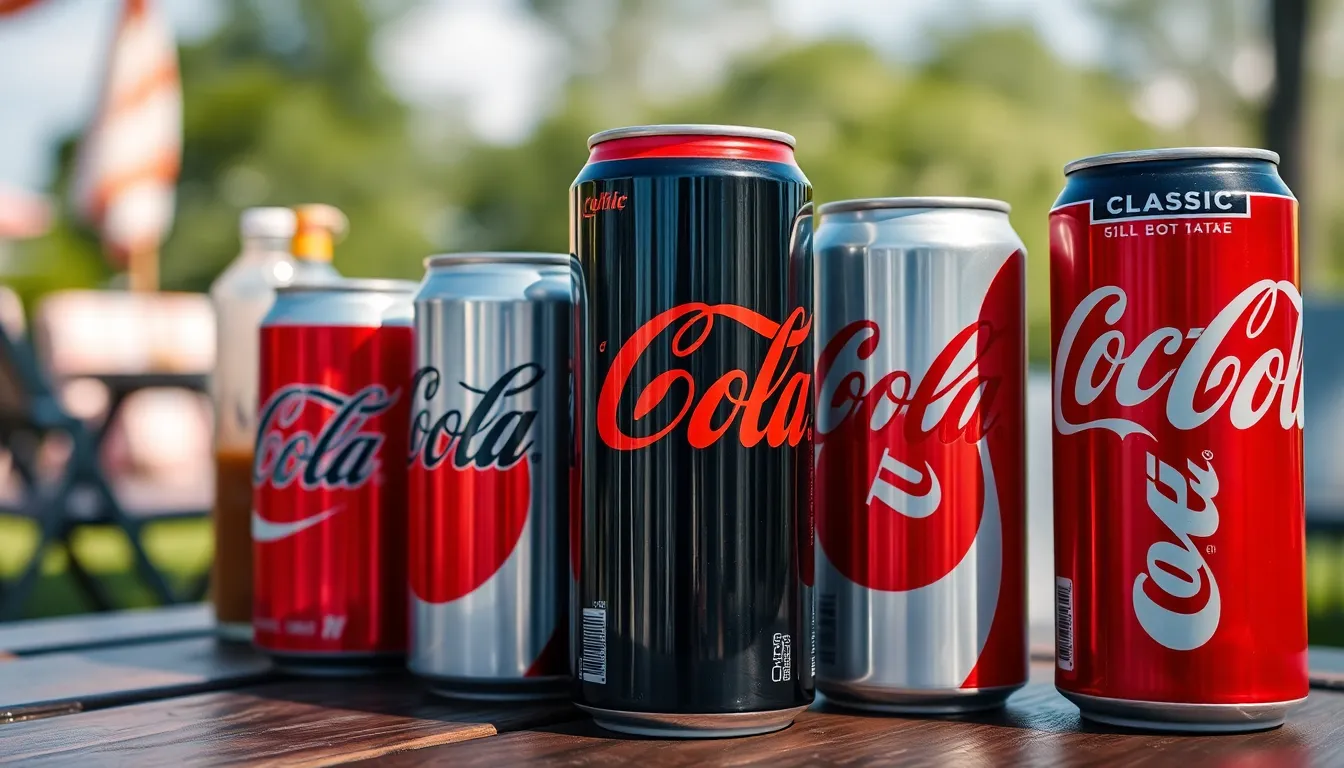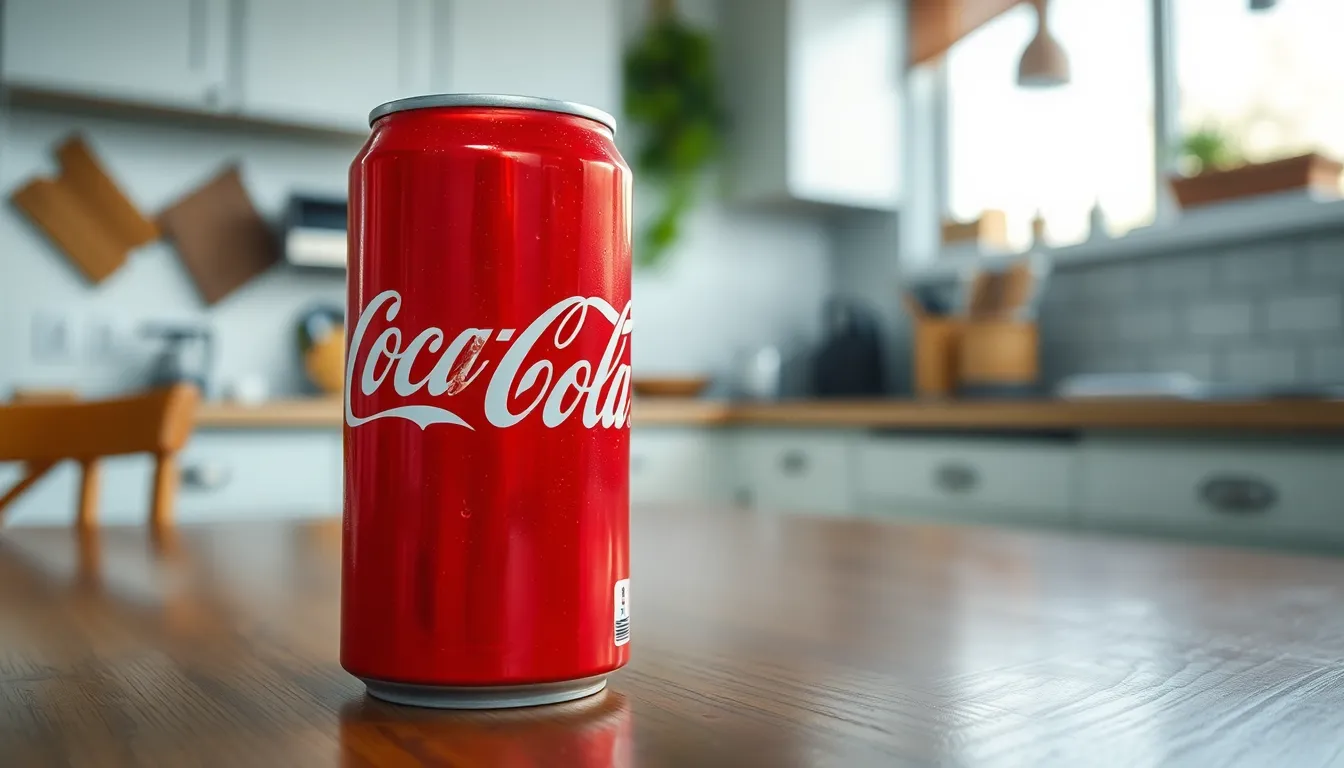Caffeine lovers rejoice! If you’ve ever cracked open a can of Coke, you might’ve wondered just how much of that delightful buzz is hidden inside. It’s not just a fizzy drink; it’s a ticket to a little pep in your step. But how much caffeine are you actually getting with each sip?
Table of Contents
ToggleOverview of Caffeine
Caffeine, a central nervous system stimulant, is commonly found in various beverages, including Coke. In a 12-ounce can of Coca-Cola Classic, there are approximately 34 milligrams of caffeine. This amount provides a moderate energy boost, appealing to many consumers.
Diet Coke contains slightly more caffeine, with about 46 milligrams per 12-ounce serving. The higher caffeine content can enhance focus and alertness. Other Coke products, like Coke Zero Sugar, also contain around 34 milligrams of caffeine in the same serving size, making them comparable to the Classic version.
Different individuals metabolize caffeine at varying rates. Some experience increased energy, while others might feel jittery or anxious. Generally, moderation is key, as excessive caffeine consumption may lead to side effects.
Reviewing caffeine levels is essential. While Coke offers lower caffeine than many energy drinks, other soft drinks like Dr Pepper contain about 41 milligrams per 12-ounce serving. Comparatively, a standard cup of coffee contains roughly 95 milligrams, demonstrating the significant differences between these popular beverages.
Caffeine isn’t purely a stimulant; it also affects hydration. Many people falsely believe that caffeinated drinks lead to dehydration. Research indicates that moderate caffeine consumption doesn’t significantly impact overall hydration status.
Recognizing caffeine content aids informed choices. Consumers can select their beverages based on caffeine preferences, aligning decisions with personal health considerations and lifestyle.
Caffeine Content in Coca-Cola

Coke offers various options, each containing different amounts of caffeine. A standard 12-ounce can of Coca-Cola Classic includes about 34 milligrams of caffeine. Options like Diet Coke contain approximately 46 milligrams. Coke Zero Sugar features caffeine levels similar to these variants, providing familiar taste with a slight kick. Other products, such as Coca-Cola Energy, have higher caffeine content, containing about 114 milligrams in a 12-ounce serving.
Different Variants of Coca-Cola
Multiple Coca-Cola variants exist, each with unique formulations and caffeine content. Coca-Cola Classic lies on the lower end, while Diet Coke packs more caffeine, making it a popular choice for consumers seeking a boost. Additionally, Coca-Cola Zero Sugar mirrors the caffeine level found in the classic version. Even newer products like Coca-Cola Energy offer significant caffeine increases, appealing to energy drink enthusiasts.
Comparison with Other Soft Drinks
Caffeine levels in Coke compare favorably with other soft drinks. For instance, a can of Dr Pepper has about 41 milligrams of caffeine, slightly more than Coca-Cola Classic. Sprite, lacking caffeine altogether, contrasts sharply with these cola options. In comparison, a 12-ounce serving of Mountain Dew contains around 54 milligrams. Caffeine in Coke remains moderate when measured against energy drinks, where caffeine levels can surge above 100 milligrams per serving.
Health Effects of Caffeine Consumption
Caffeine consumption offers both benefits and risks. Understanding these can help individuals make informed choices.
Recommended Daily Intake
Adults typically can consume up to 400 milligrams of caffeine daily, based on guidelines from health authorities such as the U.S. Food and Drug Administration. This amount equates to about four 8-ounce cups of brewed coffee or ten 12-ounce cans of Coca-Cola Classic. Pregnant individuals should limit intake to 200 milligrams per day due to potential risks to fetal health. Personal tolerance levels may vary, with some individuals experiencing sensitivity to lower doses. Tracking caffeine intake from all sources ensures moderation and promotes better health decisions.
Potential Side Effects
Caffeine can cause various side effects, especially with excessive consumption. Common side effects include jitteriness, increased heart rate, and sleep disturbances. Consuming more than 400 milligrams can heighten anxiety levels and lead to digestive issues. Frequent consumption may lead to dependency, resulting in withdrawal symptoms like headaches and fatigue when one reduces their intake. Individuals with heart conditions or specific medical conditions should consult healthcare professionals regarding caffeine consumption. Understanding these potential side effects supports responsible use and enhances overall well-being.
Understanding the caffeine content in Coke helps consumers make informed choices about their beverage intake. With varying levels across different Coke products it’s essential to be aware of how much caffeine one is consuming. While Coke offers a moderate caffeine boost compared to energy drinks and coffee, moderation remains key to avoid potential side effects. By recognizing individual tolerance and health considerations, drinkers can enjoy their favorite Coke varieties while maintaining a balanced approach to caffeine consumption.



